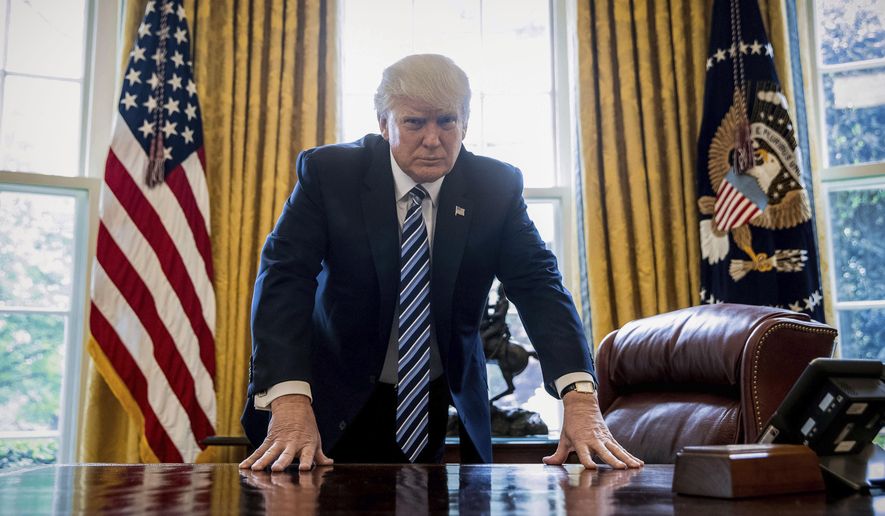President Trump’s loose lips are becoming more than a political liability — they are increasingly popping up in federal judges’ decisions, providing courts with the ammunition they need to stop the president’s agenda, particularly on immigration.
Judge after judge used Mr. Trump’s comments about Muslims to undercut his travel ban policies, and on Monday a judge in San Francisco used his words about California’s sanctuary city policies to support a ruling halting part of the president’s policy.
On Tuesday, a federal judge in Maryland cited Mr. Trump’s tweets as an example of bad policy-making, even going so far as to put screen captures of three tweets in his opinion halting the president’s policy against transgender troops serving in the military.
“A capricious, arbitrary, and unqualified tweet of new policy does not trump the methodical and systematic review by military stakeholders qualified to understand the ramifications of policy changes,” Judge Marvin J. Garbis wrote.
The next hurdle for Mr. Trump’s prolific pontificating could be his attempt to roll back the Obama-era Deferred Action for Childhood Arrivals amnesty, which faces challenges in courts from California to New York.
The president may have undercut his own legal argument in that case by saying he might extend the program beyond the March cutoff date he had set, Michael Mongan, the deputy solicitor general of California, told a federal appeals court this month. That contradicts Attorney General Jeff Sessions, who argues that DACA is illegal.
“The president of the United States has said that he was the one who made the decision, and he has said that he feels free to revive DACA if Congress doesn’t act before March 5, suggesting a view that it is in fact a lawful program,” Mr. Mongan told the 9th U.S. Circuit Court of Appeals.
Mr. Trump isn’t the first president to have his statements come back to bite him.
President Obama’s comments on the limits of his immigration powers helped sink his effort in 2014 to expand the DACA program beyond Dreamers to include about half of all illegal immigrants in the U.S.
But analysts said the issue is increasingly popping up with Mr. Trump.
Katherine Shaw, an associate professor at the Cardozo School of Law, has published what is billed as the first systematic treatment of judges’ use of presidential speech in legal cases. She found cases dating back a century in which judges looked to presidential speeches.
She found no firm consensus, however, on what sort of weight judges give a president’s words.
Ms. Shaw suggested that one answer would be to look to a president’s words when judges are trying to determine the purpose of an executive action but not to rely on them for policy guidance when they clearly are contradicted by the plain language of an executive order or Justice Department arguments.
Josh Blackman, a professor at the South Texas College of Law, said when he filed briefs several years ago arguing that a judge should take note of Mr. Obama’s public statements in the case over the 2014 DACA expansion, he struggled to find a clear precedent that courts should look to presidential comments.
It turns out Judge Andrew S. Hanen didn’t mind.
Judge Hanen even sought out Mr. Obama’s public statements to use as evidence that the president knew he was abusing his executive powers. The 5th U.S. Circuit Court of Appeals, which upheld Judge Hanen’s ruling blocking Mr. Obama’s moves, also cited the president’s words as evidence against him.
Chief Justice John G. Roberts Jr. did the same thing during oral arguments on the case last year, questioning why Mr. Obama repeatedly said he didn’t have the power to grant a deportation amnesty to millions of people — and then did just that.
Mr. Obama’s attorney replied that the president, a constitutional law professor, must have changed his mind after talking with other lawyers.
Mr. Blackman said the level of value a judge gives a presidential comment should depend on the context.
In the case of the travel ban executive orders, where the law appears to give Mr. Trump broad latitude, if the plain language of his order is clear, then judges shouldn’t have tried to pierce the veil and search for ulterior motives, he said.
But in domestic cases, Mr. Blackman said, higher standards of scrutiny apply to presidential actions and looking at presidential statements makes more sense.
“Alas, Trump’s usual incoherent and meandering style of speech, where he disregards all legal particularities, is not a model to establish the government’s position,” Mr. Blackman said. “My general take is that the statements are fair game, but do not establish the sorts of ’silver bullets’ the judges so far have found.”
The White House declined to answer questions about the legal troubles stemming from Mr. Trump’s verbosity but expressed confidence that the president will prevail in ongoing lawsuits such as defending his decision to phase out DACA.
Mr. Blackman, though, said Mr. Trump’s comments on DACA could undercut the Justice Department’s defense.
“The answer in a normal time would be for DOJ to say POTUS misspoke,” he said. “But judges treat every tweet as gospel.”
Joan Biskupic, a longtime Supreme Court reporter who now serves as a legal analyst for CNN, has written about Mr. Trump’s words affecting yet another case of a black man who was protesting at a Trump campaign rally and says he was roughed up by Trump supporters.
Ms. Biskupic said the judge found himself looking at whether the president’s comment from the stage to “get ’em out of here” amounted to inciting violence.
• Stephen Dinan can be reached at sdinan@washingtontimes.com.




Please read our comment policy before commenting.